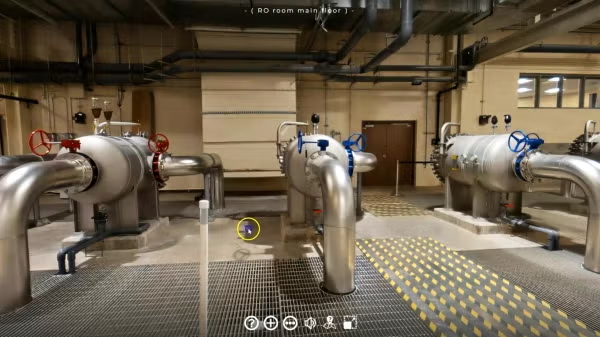Materials scientist and mother finds new path exploring sustainability, circular economy of plastics

Fatima Hafsa, College of Global Futures Spring 2022 Outstanding Graduate.
Editor's note: This story is part of a series of profiles of notable spring 2022 graduates.
Fatima Hafsa knew she wanted to be a scientist from a young age. Growing up near Karachi, Pakistan, she worked hard to be considered for the engineering program. But as a young child dreaming of her future, the materials engineer would have never imagined her journey would lead to a doctorate in sustainability, focusing on the sustainable circular economics of plastics.
“I absolutely loved organic chemistry. And I love the idea of polymers, specifically. But as I got into the program, I thought, I don't want to spend my life manufacturing polymers. I want to do a little bit more. How can my work impact society? How can I actively help build communities and actively help with the environment?”
That desire led Hafsa to work with the World Wide Fund for Nature in Pakistan. She began working in project development, but was soon encouraged to examine the challenge of plastic waste in the oceans and understand how waste management worked in Pakistan. With that understanding, Hasfa became a Fulbright scholar in the material science program at Georgia Tech.
“Interdisciplinary research is something that is not common, even when there are institutions present. It isn't common for public administration and economics people and engineering folks to come together to really solve sustainability issues.”
At the School of Sustainability in the College of Global Futures she found that collaborative environment. The interdisciplinary program allowed her to apply her skills and background in polymers to the circular economies of recycled materials.
“My dissertation research borrows from organizational theory, economics and public administration. I don't know where in the world I would have done a dissertation like that.”
Hafsa has thrived in the community she found in the School of Sustainability with her husband, also a doctoral student in the school, and their young child. She has two journal publications and a third coming soon. Her current research examines the roles different organizations can play in implementing a circular economy and preventing plastic waste from leaking.
Some of her work is inspired by the informal recyclers in Pakistan. In the future, she hopes to work directly with small scale recyclers, who typically do most of the recycling in some countries. And there’s a lot one can learn from them about circular economy and waste as a resource.
“One of my papers looks at scrap plastic prices. I find in some cases recyclers will pay more because they actually desire those properties," she said. "In other cases, we have to pay recyclers to recycle certain things, such as colored plastics. We can be looking at what policies are more effective and what aren't as much.”
Here she answers some questions about her time at ASU.
Question: What are your goals after graduation?
Answer: I really want to pursue an academic career. When I came in, I did not. My perspective has changed a lot because being in academia allows you to develop an independent research agenda, while still working with practitioners. Also, I like the idea of mentoring future scholars. I think there's just so much potential.
Q: What’s the best piece of advice you’d give to those still in school?
A: I would say this is something that I've been trying to practice more and haven't been able to in the last eight months. But I think you have to prioritize yourself. You have to prioritize your personal life. Because the more mentally relaxed you are, the better you're able to go in to do research. As researchers, our job involves critical thinking, and our job involves looking at issues from a fresh perspective. So if you're going to just make this your whole life about this PhD, you're actually not going to be able to do it as well. So you have to take a step back, enjoy your hobbies, have some hobbies, have some pastimes and hang out with friends. I'm glad that the School of Sustainability also encourages this.
Q: Is your research going to continue in working on lifecycle production for plastics or where do you see your research going forward?
A: Increasingly in the circular economy literature, there's a concept of sustainable circular economy, which addresses social responsibility. I've looked at the economics briefly in one of my papers, published in Public Administration Review. However, I want to study this in more detail. Where are we being socially responsible? Where's the equity, inclusion, diversity in here? Also, I will look at some specific case studies and think about how things vary in previously exploited countries.
Q: If someone gave you $40 million to solve one problem on our planet, what would you tackle?
A: I would want more childcare. I mean, think about the fact that as a young mother, I have struggled so much, because our community is not built that way. It's such a struggle. Because I don't know if I can go to places. I can't go to conferences. I can't even attend events here at ASU because I have a child with me. And so if I had $40 million, I would like to be kind to mothers and parents around the world.
More Environment and sustainability

2 ASU faculty elected as AAAS Fellows
Two outstanding Arizona State University faculty spanning the physical sciences, psychological sciences and science policy have…

Homes for songbirds: Protecting Lucy’s warblers in the urban desert
Each spring, tiny Lucy’s warblers, with their soft gray plumage and rusty crown, return to the Arizona desert, flitting through…

Public education project brings new water recycling process to life
A new virtual reality project developed by an interdisciplinary team at Arizona State University has earned the 2025…

